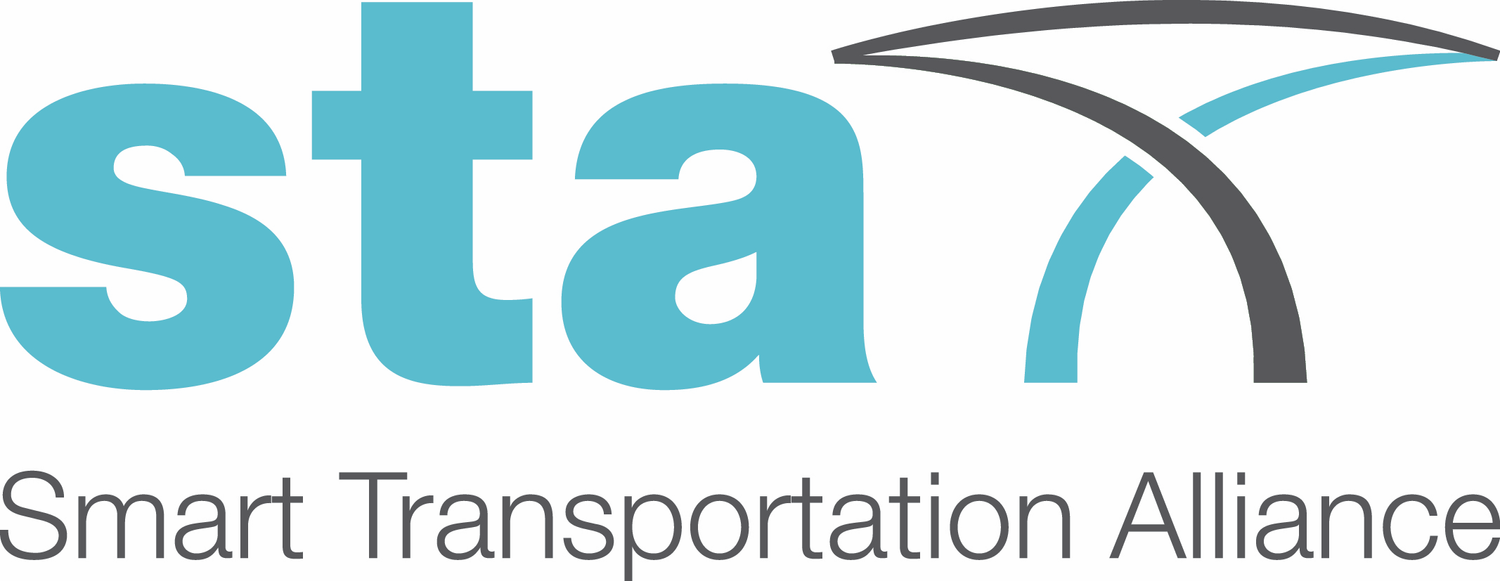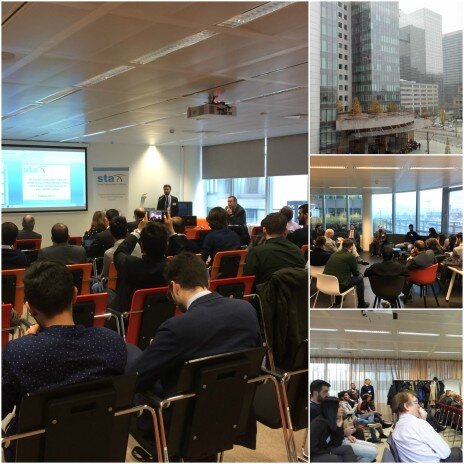STA Newsletter
Issue # November 2018
A bi-monthly online journal providing news and background about activities undertaken by STA with a view to improving the methods, technologies and standards associated to transportation infrastructures.
2018 STA Annual Conference and Innovation Awards – Proceedings and presentations now available
29 November 2018
The Smart Transportation Alliance gathered 50+ experts at its annual landmark event, the 2018 STA Annual Conference & Innovation Awards, held this year at the Federal Public Service Mobility and Transport of Belgium in Brussels on 27 November 2018.
For the third consecutive year, the event gathered researchers and experts from the areas of finance, private industry, academia and government, exchanging ideas and practices in current and future areas of intelligent transportation infrastructures!
Find out more about the conference, including full presentations and links to information about the Innovation Awardees, on the events page of our website.
We would like to thank everyone who got involved and are already looking forward to next year’s Conference!
2018 Innovation Awardees
28 November 2018
STA Annual Conference & Innovation Awards have honoured again global innovators in the following categories:
Person of the Year: Acknowledging the vital contribution, as well as the achievements of exceptional individual accomplishments in the industry.
Best Innovation Project and Solution: Recognising a project and a solution that is breaking the existing paradigms for transportation infrastructures.
The 2018 Person of the Year award was presented ex-aequo to Dr Aniceto Zaragoza (OFICEMEN) and Mr Dirk van Loo (COPRO).
Dr Zaragoza, the Director General of the Spanish Cement Association (OFICEMEN), has contributed to the development of advanced transportation infrastructures through his work for 30+ years.
The Award recognises Dr Zaragoza’s years of expertise in different institutions and organisations, and influential contribution to the transport industry both in Spain and at international level.
Mr Van Loo, CEO at COPRO (Belgium), holds 23+ years of experience in the construction and concrete sector.
The award endorses especially Mr Van Loo’s role and contribution in promoting better quality construction products through his work, namely BENOR voluntary quality mark, that increases the user confidence in the conformity of the product, process or service, by guaranteeing that well-defined quality requirements has been met accordingly.
The 2018 Best Innovation Project Award was given to SUP&R-ITN.
SUP&R ITN ran from October 2013 to October 2017 and was funded entirely by the European Commission through Marie Curie Action. The training-through-research programme has educated a new generation of multi-disciplinary professionals capable of conceiving, planning and executing sustainable road and railway infrastructures. Most of the technologies developed and researched through the programme have proved to be worthy of being further developed and are already making an impact in the industry.
The award was collected by Professor Gordon Airey and Dr Davide Lo Presti from The University of Nottingham.
The 2018 Best Innovation Solution Award was presented to Apertum, Real-Time Guide to Step-Free Mobility.
Apertum, a free mobility app, launched already in Madrid (Spain), offers real time effortless routeing to vulnerable and non-conventional public transport users, such as pregnant women, disabled and elderly. The app builds dynamic ‘bridges’ (step-free routes) that avoid non-accessible metro, light rail and tram stations/stops for the vulnerable and non-conventional population segment. It combines i) on-site assessments ii) Open Data from the City transport operators, and iii) real-time feedback from the users.
The award was collected by Mr Francisco Aletta, Innovation Manager at Etelätär Innovation OÜ.
STA Technical Report 1/2018 - "Best-Practice Guidelines for the Adaptation of Roads to Climate Change" authored by Dr Elena De La Peña and Ms Mónica López
30 November 2018
The Intergovernmental Panel on Climate Change (IPCC) identifies that regions such as North America and Europe are working on transversal adaptation policies in all areas of government, as well as protecting transportation and energy infrastructures, while in other regions, such as Latin America are still taking their first steps. Approximately 25% of the losses from natural disasters in the Latin America Region fall upon the transport sector. The adaptation of roads to climate change aims to anticipate the adverse effects of climate and take appropriate measures to avoid or minimize the damage they may cause, in order to reduce future costs and maximize investment profitability. These adaptation measures should be focused in the short, medium and long term, and complemented with environmental management, planning and disaster risk management components.
The "Best-Practice Guidelines for the Adaptation of Roads to Climate Change", published by CAF - development bank of Latin America, and developed by the Ibero-American Road Institute (IVIA) and the Spanish Road Association (AEC), aim to generate knowledge about the importance of defining infrastructure adapted to the climate throughout its life cycle, as well as to show examples, actions and measures of good practices that could be useful for its application to road projects. The Guidelines consider not only new construction of roads, but also existing road networks and seek to transfer the importance of developing strategies to incorporate the mentioned adaptation measures, considering all the stakeholders involved in the Region, both public and private.
These Guidelines are an interesting contribution to improving knowledge about the importance of incorporating measures of adaptation to climate variability and change in planning, design, construction, maintenance and management of roads. You can obtain the full paper here.
“
The adaptation of roads to climate change aims to anticipate the adverse effects of climate and take appropriate measures to avoid or minimize the damage they may cause, in order to reduce future costs and maximize investment profitability.”
NEWS OF INTEREST
Will Alibaba’s Smart Roads Pave the Way for L5 Autonomous Vehicles?
In the 1950s the philosophy informing the futuristic vision of autonomous vehicles was to “make the road guide the car” via electronic and mechanical devices embedded in high tech roadways. Scientists did not seriously consider building smart tech or advanced sensors into the vehicles themselves: it would have been impossible to stuff the 30-ton computers of the time into a Ford sedan; radar and lidar were only seen on advanced fighter aircraft; and the concept of computer vision software had yet to be conceived.
TransitScreen launches mobile app CityMotion
Since its launch in 2013, TransitScreen has worked to curate local, real-time mobility information into a single hub to simplify trip planning and public transit use. In a June interview with Smart Cities Dive, TransitScreen CEO and co-founder Matt Caywood touted the company's unique business model — selling transit information to real estate clients — as "scrappy," noting, "We're able to make a very large impact on smart cities while still being a very small and lightly-funded company."
Cutting edge: assessing the potential of edge computing in transport
Edge computing takes computation power and data storage and places it in the environment in which it is needed, as close to the action as possible. Lots of services make use of centralised computing in the cloud, but companies are increasingly looking away from the cloud to edge computing, to provide a balance between bandwidth, security, latency and cost at the edge verses big data analytics in the cloud. In the last 10 years, a lot of companies have moved their infrastructure costs over to the cloud – even from a personal point of view, most of us have a Dropbox or iCloud account. These companies have three main reasons for wanting to move away from cloud.
Mercedes-Benz, Bosch to offer self-driving car rides in San Jose, California
Mercedes-Benz parent company Daimler and auto supplier Bosch plan to launch a self-driving car pilot for the public in San Jose, California, in the second half of 2019.
The two German auto companies have been quietly collaborating to deliver advancements in an increasingly competitive global race to make autonomous cars a reality.
This Startup's Robots Hold Your Favorite Parking Space At The Mall -- Even On Black Friday
When you’re really desperate for parking, you might pull the Los Angeles classic: getting a friend to stand in that sweet parking spot you just saw until you can circle back to it, even if someone else is closer and ought to have first dibs. Don't do that. It's not nice and besides, in some areas, a robot will do it for you.
MyPark, a Miami-based parking reservation service, deploys mobile space blockers to hold spots for customers willing to pay a few dollars for the convenience via its smartphone app.








